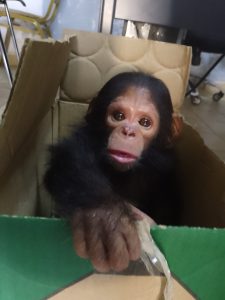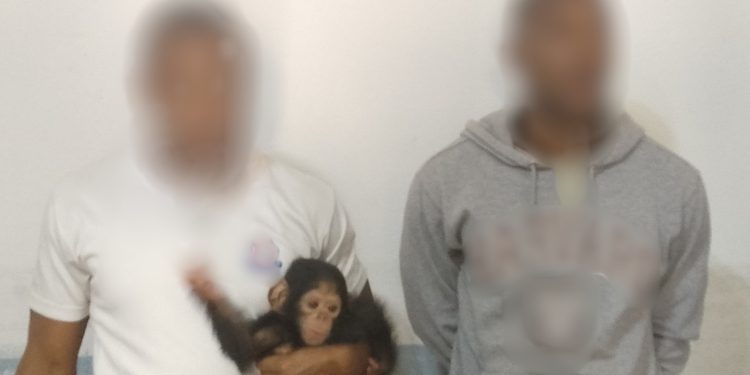On September 20, 2024, a joint operation conducted by the Provincial Directorate of Water and Forests in Ogooué-Maritime, the provincial branch of the General Directorate of Research (DGR), and supported by the NGO Conservation Justice, led to the arrest of two Gabonese individuals caught in the act of attempting to sell a baby chimpanzee. This arrest is part of ongoing efforts to combat the trafficking of protected species in Gabon.
The suspects, N.G and M.R, were apprehended as they prepared to finalize the transaction in Port-Gentil, the provincial capital. The chimpanzee, transported in a box, was about to be sold, which constitutes a serious offense under Gabonese law. N.G admitted during questioning that he was unaware that the sale, possession, and transportation of protected species, such as chimpanzees, are illegal in Gabon. He stated that he had purchased the baby chimpanzee from a certain M.I.V, while M.R had merely accompanied him to the transaction.
Legal penalties and health risks

The traffickers face a prison sentence of up to six months, along with a fine ranging from 100,000 to 10 million CFA francs. This penalty underscores the severity of the crime, as chimpanzees are classified among fully protected species.
Beyond the legal risks, the possession of primates poses significant health dangers. Due to their genetic proximity to humans, chimpanzees can carry zoonotic diseases, which are transmittable between animals and humans. These include Ebola, monkeypox, and tuberculosis. Such diseases can be fatal and spread rapidly. Additionally, reports of bites from primates, especially as they reach adulthood, are common and can result in serious injuries.
The trafficking of wildlife, particularly protected species like great apes, not only violates Gabonese laws but also presents a major threat to public health and the local ecosystem balance.
Fanta Mabo








